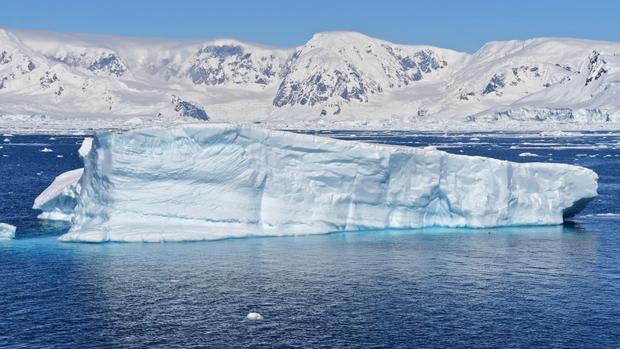 This Nov 07, 2019, photo shows a glacier at Chiriguano Bay in South Shetland Islands, Antarctica. (JOHAN ORDONEZ / AFP)
This Nov 07, 2019, photo shows a glacier at Chiriguano Bay in South Shetland Islands, Antarctica. (JOHAN ORDONEZ / AFP)
While a great deal of attention has been focused on the melting of the Greenland and Antarctic ice sheets, a new study has warned that the world's glaciers are melting faster and contributing more to rising sea levels.
Scientists say that as a cause of sea-level rise, glacier loss was second only to thermal expansion, which is prompted by higher ocean temperatures
Scientists say the loss is the equivalent of submerging the entire landmass of England under two meters of water every year.
Sue Cook, an Antarctic glaciologist with the University of Tasmania, Australia, told China Daily that glaciers in every region of the world have been thinning, generally at increasing rates.
"This mass loss makes an important contribution to global sea level rise. But I think it's also worth highlighting that the shrinking of glaciers presents other urgent risks."
About 2 billion people worldwide depend on meltwater from glaciers and snow packs for drinking water, irrigation, or power generation, she said.
ALSO READ: Global ice melt matches worst-case climate scenario, study says
"As glaciers shrink, this water supply will be placed under threat." Between 2000 and 2019 glaciers lost 267 gigatons of ice a year, equivalent to 21 percent of sea-level rise, according to the study "Accelerated Global Glacier Mass Loss in the Early 21st Century", published in the science journal Nature.
The authors mapped the world's 271,175 glaciers using more than 500,000 satellite images from 2000 to 2019.
Estimates validated
They validated their estimates with available independent, high-precision measurements and calculated the volume and mass change of individual glaciers.
The study is the most comprehensive yet of how glaciers have changed this century, and that it "makes for disturbing reading", Cook said.
A special report titled "Ocean and Cryosphere in a Changing Climate" by the UN Intergovernmental Panel on Climate Change said recently that in some regions, glaciers could lose more than 80 percent of their current mass by 2100, with impacts on agriculture, local ecosystems, tourism, and socioeconomic development.
Studies like the one published in Nature are difficult to undertake because glaciers are "often found in hard-to-reach places", Cook said.
"Although satellite records allow glaciologists to study broader areas, they often suffer from poor resolution and time coverage."
A comprehensive study like this one is "enormously valuable, because it allows us to take stock of how changing environments combine to make a big global impact".
Scientists say that as a cause of sea-level rise, glacier loss was second only to thermal expansion, which is prompted by higher ocean temperatures.
READ MORE: Sea of slush: Arctic sea ice lows mark a new polar climate regime
The lead author, Romain Hugonnet, of the University of Toulouse, France, said the data represents an urgent warning.
"A doubling of the thinning rates in 20 years for glaciers outside Greenland and Antarctica tells us we need to change the way we live. We need to act now. It can be difficult to get the public to understand why glaciers are important because they seem so remote, but they affect many things in the global water cycle including regional hydrology, and by changing too rapidly, can lead to the alteration or collapse of downstream ecosystems."


